Community platform for migrant workers in Hong Kong aims to fill gaps in existing support – starting with the hunt for a missing mother
- Pangyao promotes relevant social events and services, while its growing social media presence highlights personal issues and family problems
- It is currently helping a Filipino domestic helper track down her mother, who was last seen by her three daughters in 2001

When Jennylyn Pascual spotted a Facebook post asking to hear her story, her heart skipped a beat. Finally, there may be someone who could help her find the mother she has not seen in nearly two decades.
Like most Filipinos living in Hong Kong, Pascual is a domestic worker. She moved to the city with the hope of furthering the search for her long-lost mother, but since arriving at the end of 2018 she has found few people even willing to listen to her plight, let alone help her search.
“I saw this post in my [Facebook] newsfeed, which said ‘tell me your story’,” recalls the 39-year-old, who lives with her employer in Tsuen Wan. “I think only they can help me. I’m so full of hope.”
That post came from Pangyao, a new community platform for migrant workers in Hong Kong, which is currently mobilising its resources to track down Florinda Espiritu Pascual. She migrated to Malaysia more than 30 years ago, where she remarried and converted to Islam. She last saw her three daughters in 2001, at Jennylyn’s college graduation ceremony in the family hometown of San Agustin, in the province of Isabela in the northern Philippines.

Jennylyn now has three children of her own, all still living in the Philippines. The eldest, Hillary, will graduate in March, and Jennylyn’s dream is to unite the three generations before her daughter’s graduation celebration.
“It’s a very, very sad story – it’s been [almost two decades] we didn’t hug her, we didn’t see her, we didn’t know if she’s still alive,” she says. “That’s why every Christmas, every new year, my mother is always in my mind – how can I see her?